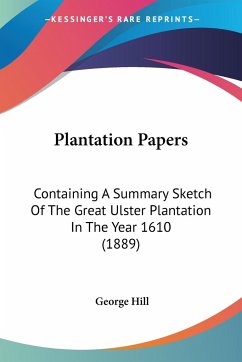
The Plantation of Ulster
Versandkostenfrei!
Versandfertig in 1-2 Wochen
16,99 €
inkl. MwSt.

PAYBACK Punkte
8 °P sammeln!
During the reign of James I, an official scheme was drawn up for the 'plantation' of designated areas in west Ulster. However, the actual area settled by the new colonists was much more extensive. With them came innovation. A radical transformation of the landscape began. The spread of a market-based rural economy resulted in a quite spectacular growth in urbanisation. Permanent dwellings of a more sophisticated construction became the norm in many areas, and around the towns new field patterns emerged. The spread of hedged enclosures heralded innovations in agricultural methods, tools, livest...
During the reign of James I, an official scheme was drawn up for the 'plantation' of designated areas in west Ulster. However, the actual area settled by the new colonists was much more extensive. With them came innovation. A radical transformation of the landscape began. The spread of a market-based rural economy resulted in a quite spectacular growth in urbanisation. Permanent dwellings of a more sophisticated construction became the norm in many areas, and around the towns new field patterns emerged. The spread of hedged enclosures heralded innovations in agricultural methods, tools, livestock, and systems of land tenure. In a more abstract sense, the settlers also brought with them a new language, new surnames, new religion and of course a change in political and historical allegiances. This account of the plantation landscape shows how colonisation on the ground was not as much influenced either by the London Government or by the new landowners as has often been assumed. Environmental factors proved more important than governmental controls in shaping the emerging settlement pattern. The author also demonstrates how seeds of bitterness were quickly sown between the Protestant settlers and the Catholic natives whom they had displaced, with consequences that last to this day.












